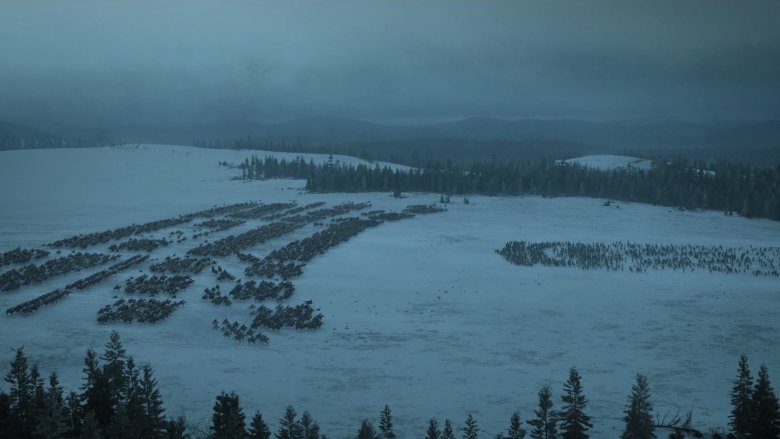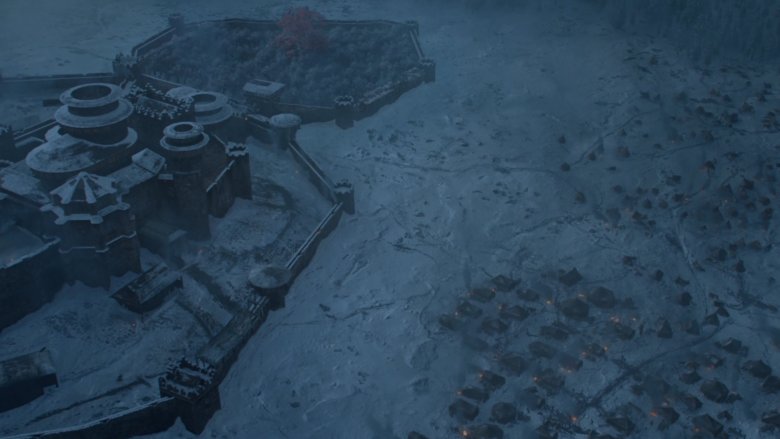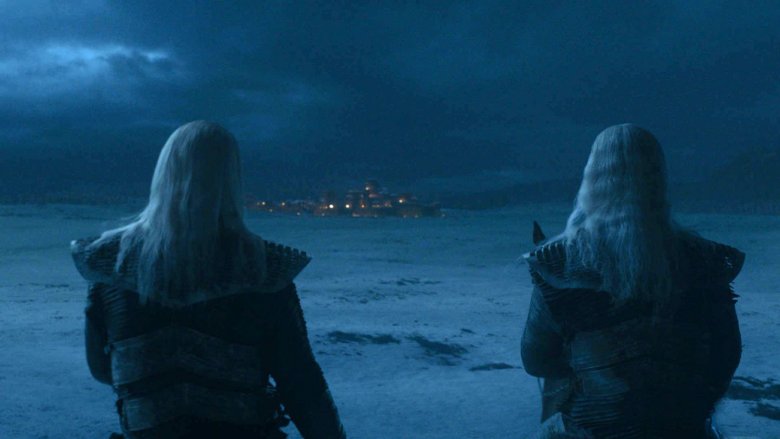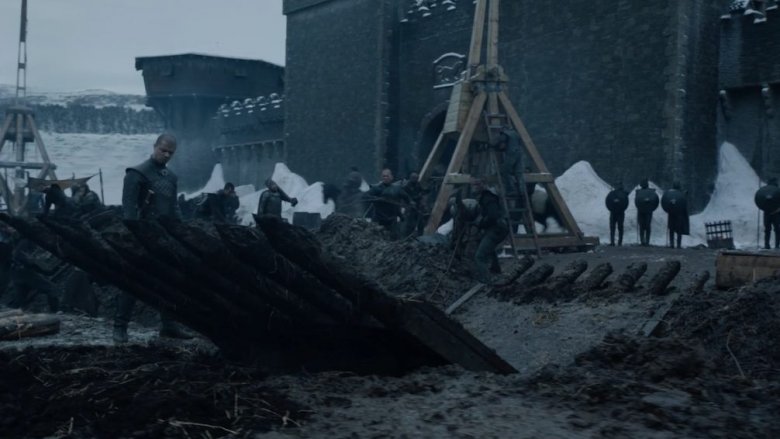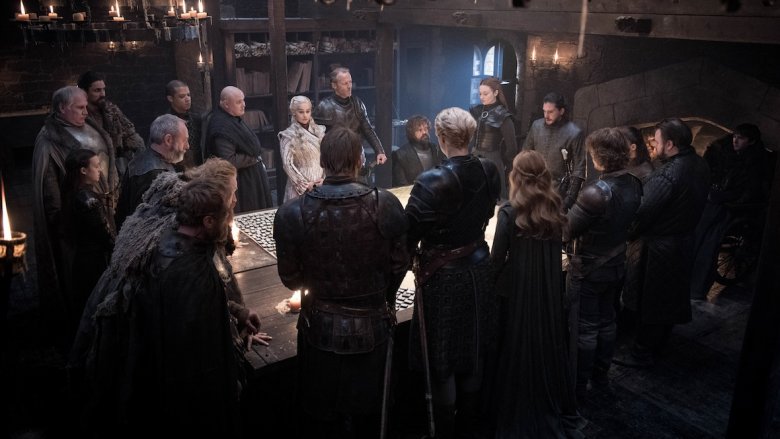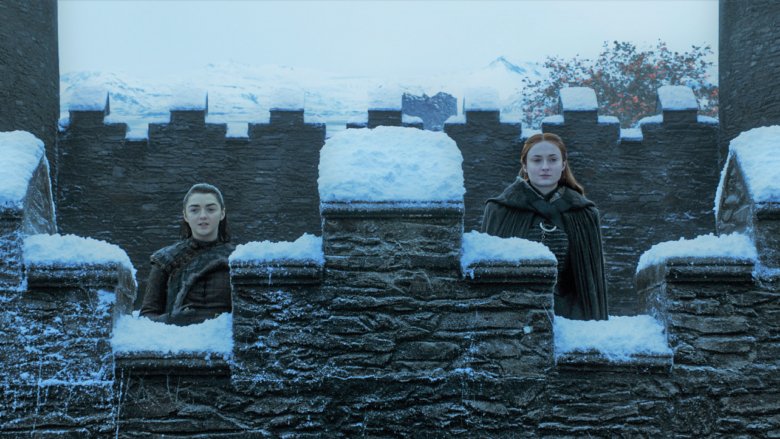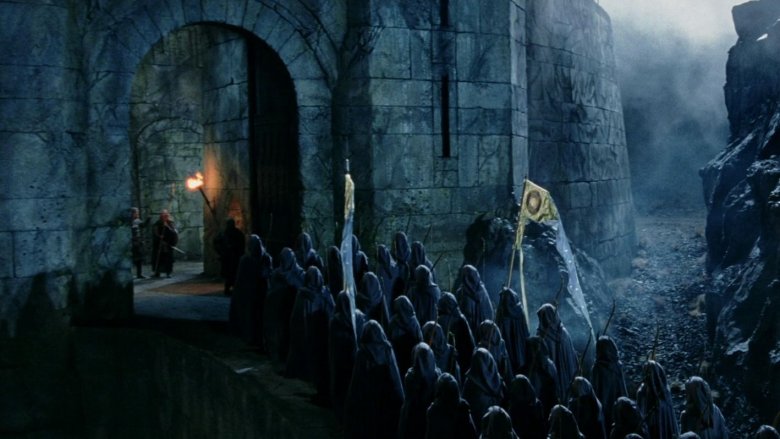The Untold Truth Of GoT's Battle Of Winterfell Episode
HBO's juggernaut series Game of Thrones has accomplished plenty of milestones during its eight-season run, setting an Emmys record for most series nominations as well as breaking records in both ratings and budgets, especially for the show's eighth and final season. The third episode of season 8 is one of the most highly anticipated of the entire series, considering it will feature a battle that many fans have been waiting for since the show's very first episode, in which the Army of the Dead will arrive at Winterfell and finally face off against our favorite heroes. With so many of the show's characters now sequestered at the Northern stronghold, eager fans are wondering who will live and who will die, not to mention who might become a White Walker.
As fascinating as the battle at Winterfell will undoubtedly be on screen, the stories behind it are just as crazy, from intense shooting schedules to supersized episodes to the showrunners' inspirations. Here's the no holds barred, untold truth of Game of Thrones' legendary Battle of Winterfell.
It's the longest episode of Game of Thrones ever
Just like any traditional television drama, Game of Thrones has traditionally trafficked in hour-long episodes, with some skewing slightly shorter or slightly longer (infamously, season seven's "The Spoils of War," which features an intense battle scene where Daenerys attacks Lannister forces, is actually under an hour long). With only six total episodes in the final season, fans were extremely anxious to hear what the runtimes would be on each episode, since they were already getting four fewer episodes than they had hoped.
All of the final seasons' episode runtimes were ultimately revealed, albeit missing the titles (which are likely rife with spoilers of their own), and though the first two episodes of the season both had runtimes of under an hour, the final four episodes all far surpassed that — at 82 minutes, the final season's third episode is now the longest in the entire series, beating even the series finale by just a few minutes.
It's set to be the longest battle in film and television history
Thanks to a supersized runtime for the episode as a whole, fans can also expect as much battling as they can possibly handle. As usual, the people behind Thrones are going above and beyond in pushing the final season to its ultimate limits, and what they've ended up with is a battle sequence that will break records by becoming the longest battle scene ever committed to film, either for television or movies.
Directed by Miguel Sapochnik and written by showrunners David Benioff and D.B. Weiss, this epic battle is not only on the hugest scale possible, but will be unlike anything Thrones fans or fantasy lovers have ever even seen before. Co-executive producer Bryan Cogman told Entertainment Weekly that the battle is not only enormous in length and ambition, but that it folds in several genres at once. Avengers: Endgame might have preceded the Battle of Winterfell by a few days, but it looks like the end of April is a pretty good time for fans of epic battle scenes.
The shoot was especially grueling
With a particularly long battle sequence comes an intense shooting schedule, and this battle was no exception — in fact, by all accounts, it was about as harrowing as being in an actual medieval war (well, almost). The shoot itself took place over 11 weeks of night shoots in Belfast during the winter, pushing both actors and the crew to their brink. All told, the shoot required 750 people. Some actors, like Maisie Williams (who plays the inimitable Arya Stark) got warnings from Sapochnik about just how difficult the shoot would be. Still, nobody was fully prepared for the freezing conditions, long nights, and numerous other obstacles this shoot brought with it.
Actors and crew members alike endured impossible conditions — a regular actress (kept anonymous by Entertainment Weekly's set report) collapsed during filming and had to be hospitalized, and despite paper masks for safety during smokier scenes shot on a soundstage, one crew member suffered an asthma attack.
For their part, the actors have been pretty vocal about their own hardships. Iain Glen, who plays Jorah Mormont, called it "really miserable," going so far as to describe it as "the most unpleasant experience [he's] had on Thrones." Meanwhile, Rory McCann, who plays the Hound, revealed that "everybody prays they never have to do this again."
The cast is especially massive
Since the first season, one of the trademark moves of Thrones has been that the show constantly separates its stars, sending them to far-flung locations and keeping them apart until their characters finally meet. In early seasons, putting Emilia Clarke in Morocco (across the Narrow Sea), Kit Harington in Iceland (the Wall), and Peter Dinklage in Croatia (King's Landing) was just one example. It often seemed as if everyone's favorite characters would never end up meeting at all.
However, throughout the series, characters have found their way to each other. Tyrion (Dinklage) and Daenerys (Clarke) eventually met up in Mereen, where he escaped the fighting pits and rose to become Hand of the Queen. Daenerys welcomed her nephew/boyfriend, Jon Snow (Harington) to Dragonstone. Once the eighth season premiere ended — thanks to one last arrival from Jaime Lannister (Nikolaj Coster-Waldau) — most of the show's integral cast was finally together.
Some big names, like Cersei Lannister (Lena Headey) are still sequestered in faraway spots like King's Landing, but with the battle at Winterfell, the rest of the show's most prominent characters will be a part of the battle at Winterfell, marking the first time the show has really brought together these vital personalities. It's definitely bittersweet that this might be the last time the audience sees some of these characters, but at least we got them together this one time.
They shot on the actual Winterfell set
Filming an ambitious and larger-than-life sequence like the Battle of Winterfell was going to be difficult enough, but of course, Sapochnik and the showrunners decided to up the ante once more by changing the schedule around for one very specific reason. Most of the time, when a film or television show has a huge battle to shoot, they build smaller parts of the set and break up the filming over time. They also typically require fewer members of the cast and crew to be there for the entire filming schedule, but Sapochnik had a different idea.
When recounting the filming process to Entertainment Weekly, Sapochnik pointed out that since the show had already built plenty of new Winterfell set pieces for the eighth season, they filmed it "like a Marvel movie," rather than filling in blanks with smaller sets and green screens. Even though producers warned Sapochnik against this method, he insisted, and thanks to Benioff and Weiss' approval, he created a shooting schedule that would later be called "The Long Night." It's sure to pay off in the end, since the flow will be better than something shot in bursts, and perhaps even the actors and crew will realize their sacrifice was worth it.
The creators took inspiration from another famous battle scene
One of the most famous battles in cinematic history, which is nearly as long as the Battle at Winterfell, played an integral role while creating Thrones' biggest sequence to date. The second installment of the Lord of the Rings trilogy, The Two Towers, spends its three-hour runtime building toward the epic, climactic Battle of Helm's Deep. Hailed as one of the best battles in all of cinema, the 40-minute sequence finds the men of Middle Earth facing off against an army of vicious, formidable orcs on a rain-drenched night. It's one of the most memorable moments not only of the entire trilogy, but in the history of fantasy movies. Clearly, some of the minds behind Thrones thought so too.
Sapochnik has cited Helm's Deep as one of the major influences on Winterfell's battle, which makes perfect sense; both have fantastical yet medieval settings and feature a massive army of inhuman creatures facing off against a smaller band of ill-equipped yet fearless humans. Helm's Deep ended well for most of the heroes, but knowing Thrones, a good outcome may be where these two sequences' similarities end.
